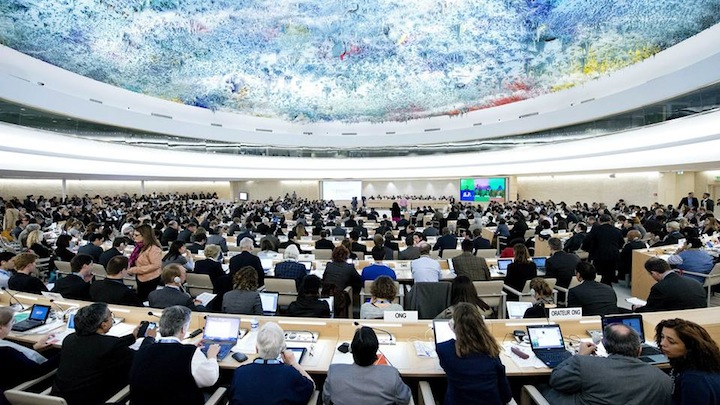The Maldives has deferred accepting or rejecting recommendations put forth at the UN human rights council on judicial reform and protection of human rights defenders, pending “national level consultation”.
Of the 258 recommendations from UN member states, the government accepted 132 and rejected 49 due to constitutional constraints. The Maldives said it will examine the remaining 77 recommendations and “provide responses in due time” before the 30th session of the Human Rights Council in September or October 2015.
The recommendations under review include calls to ensure the impartiality and independence of the judiciary, reform the Judicial Service Commission, and provide training to judges.
The “politicised” judiciary came under fire from countries across the world during last week’s UPR session, which took place amidst heightened international scrutiny and political turbulence triggered by the imprisonment of former president Mohamed Nasheed.
The UK recommended steps to “ensure the administration of justice is fully consistent with international human rights standards and seek international technical assistance.”
“Strengthen the independence of the judiciary by reforming the Judicial Services Commission’s process for selecting and appointing judges,” recommended the US.
Canada advised the formation of an independent bar association while several countries recommended steps to ensure the separation of powers.
Ireland recommended providing “adequate training for judges, including human rights training, to ensure all judicial proceedings conform to international fair trial standards”.
New Zealand recommended accepting “a follow up visit by the Special Rapporteur on the independence of judges and lawyers and accept the outstanding request of a visit by the Special Rapporteur on the situations of human rights defenders.”
The Netherlands advised fully implementing the special rapporteurs’ recommendations, including a constitutional review of the composition of the JSC.
Responding to criticism of the judiciary at the working group session, foreign minister Dunya Maumoon said the Maldives is training and building capacity of judges and has formulated a judicial sector strategic action plan to increase effectiveness, efficiency and public confidence.
The 49 recommendations Maldives rejected include allowing freedom of religion, ensuring the rights of homosexuals, banning the death penalty, and decriminalising consensual sexual relations.
The rejected recommendations also included removing a requirement that prevents non-Muslims from being members of the Human Rights Commission of Maldives (HRCM).
The Maldives constitutional assembly had declared Islam to be the state religion and the basis of all laws enacted in the country, and requires judges to refer to Islamic law, legal secretary Aishath Bisham said last week.
Other rejected recommendations included calls from Norway and Canada to release ex-president Nasheed and other “political prisoners.”
The US also called for an end to “politically-motivated prosecutions and court proceedings” against HRCM members and Nasheed, who was “convicted and imprisoned without minimum fair trial guarantees”.
Human rights defenders
Several countries also recommended taking steps to ensure the safety of human rights defenders, civil society actors and journalists against attacks and reprisals, calling for investigation and prosecution of individuals behind threats and intimidation.
The independence of the HRCM should also be assured, its members protected from reprisals, and the HRCM law brought in line with Paris Principles, reads the recommendations under review.
During the review, many countries expressed alarm over the Supreme Court’s suo moto case against the human rights watchdog over its UPR submission.
Denmark meanwhile noted that the Maldives’ initial report to the UN Committee against Torture is overdue since 2005.
“Bring an end to arbitrary detentions, particularly on the grounds of political opinion; investigate allegations of torture and ill treatment in prisons and bring those responsible to justice,” recommended France.
Other recommendations included ratification of the International Convention on the Protection of the Rights of All Migrant Workers and Members of Their Families, the International Convention for the Protection of All Persons from Enforced Disappearance, and the optional protocol of the Convention on the Rights of the Child.
Germany and Portugal recommended the Maldives accede to Convention relating to the Status of Refugees, the Convention relating to the Status of Stateless Persons, and the Convention on the Reduction of Statelessness.
Other countries recommended signing the UNESCO Convention against Discrimination in Education and the Protocol to the Convention Against Transnational Organised Crime.


 Death penalty legislation was presented to parliament in June by government-aligned Dhivehi Qaumee Party (DQP) MP Riyaz Rasheed to implement the death penalty by hanging if the Supreme Court upheld a death sentence passed by a lower court. The legislation was put to a vote to decide whether or not to proceed with the bill at committee stage and was ultimately
Death penalty legislation was presented to parliament in June by government-aligned Dhivehi Qaumee Party (DQP) MP Riyaz Rasheed to implement the death penalty by hanging if the Supreme Court upheld a death sentence passed by a lower court. The legislation was put to a vote to decide whether or not to proceed with the bill at committee stage and was ultimately